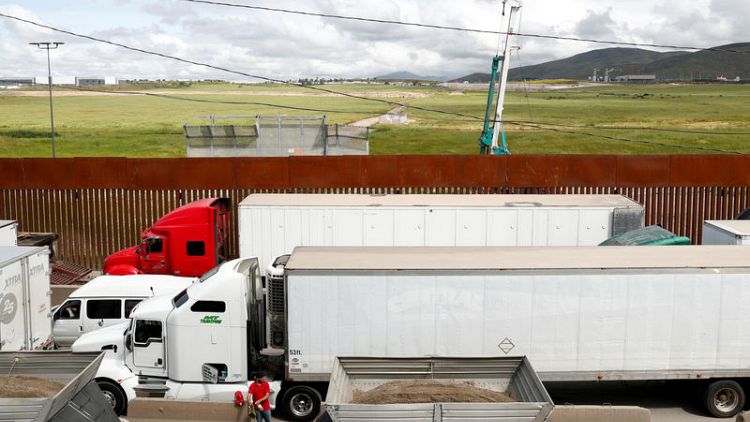By Jose Gallego Espina
SAN DIEGO (Reuters) - Trucks inched through traffic and some stores reported fewer customers in U.S.-Mexico border towns on Wednesday, as staffing shortages tied to a surge in asylum seekers slowed checkpoints and threats of closing the border completely scared shoppers.
U.S. President Donald Trump reiterated his threat to close the border, or parts of it, saying Congress could avert such a shutdown by changing laws to fix what he called immigration "loopholes."
Business leaders on both sides of the border have lashed out against the threat, saying a shutdown would hurt supply chains and $1.7 billion in daily trade at some of the world's busiest land crossings.
Already, Washington's decision to move some 750 agents from commercial to immigration duties has triggered long delays for legitimate cross-border traffic.
Petra Gomez, 63, who owns discount store Buy 4 Less near the Otay Mesa crossing in California, opposite Tijuana, said Trump's threats were also taking a toll.
"Many people are not crossing for fear that if they close the border, they will be trapped," she said, referring to the tens of thousands of people who cross every day from the Tijuana area into California. "If they close the border, I will have to close because I will not have clients."
However, Mexican President Andres Manuel Lopez Obrador said on Wednesday there were no "serious problems" at the border, and that the government was in constant communication with U.S. authorities to keep it open.
"It's not in anyone's interest to close the border," he told reporters at his regular morning news conference.
U.S. Customs and Border Protection (CBP) has estimated that some 100,000 migrants were apprehended or encountered at the border in March, the highest level in a decade. Most are Central American families claiming asylum.
The CBP said it would suspend cargo operations every Saturday at one of its El Paso crossing points until it had enough staff to operate fully.
On Wednesday, some, but not all, lanes were open to commercial traffic at El Paso, Laredo and Otay Mesa. The longest wait stretched up to five hours at a section of the El Paso crossing where only one of six lanes was open at a major bridge, according to the CBP. In Ciudad Juarez, across the border from El Paso, lines of trucks were longer than usual, according to a Reuters witness.
Mexico is the third-largest trading partner of the United States, and is its largest supplier for agricultural products, including vegetables and avocados. (See graphic on trade and migration at the U.S.-Mexico border https://graphics.reuters.com/USA-IMMIGRATION-TRUMP/0100919N1TG/index.html.)
"Avocados in particular have the potential to become the new green gold in terms of prices," if a shutdown caused shortages, Moody's said in a report on Wednesday.
Americans would run out of avocados in three weeks if imports from Mexico were stopped, Steve Barnard, president and chief executive of Mission Produce, the largest distributor and grower of avocados in the world, said this week.
The Business Roundtable, a powerful private sector lobby, said in a letter to White House officials on Wednesday that shutting the border would severely damage U.S. businesses, particularly those that depend on employees who commute daily to work from Mexico.
Luis Ventura, 23, crosses from Tijuana every day to work at a customs agency in San Diego. More than just concern over his job, he fears a shutdown would take him away from his son.
"If you close the border, either I stay in Tijuana without work or I stay here without family," he said.
(Reporting by Mexico City Newsroom, Jose Gallego Espina in San Diego, Jose Luis Gonzalez in Ciudad Juarez and Alexandra Alper in Washington, Writing by Daina Beth Solomon; Editing by Frank Jack Daniel and Rosalba O'Brien)
